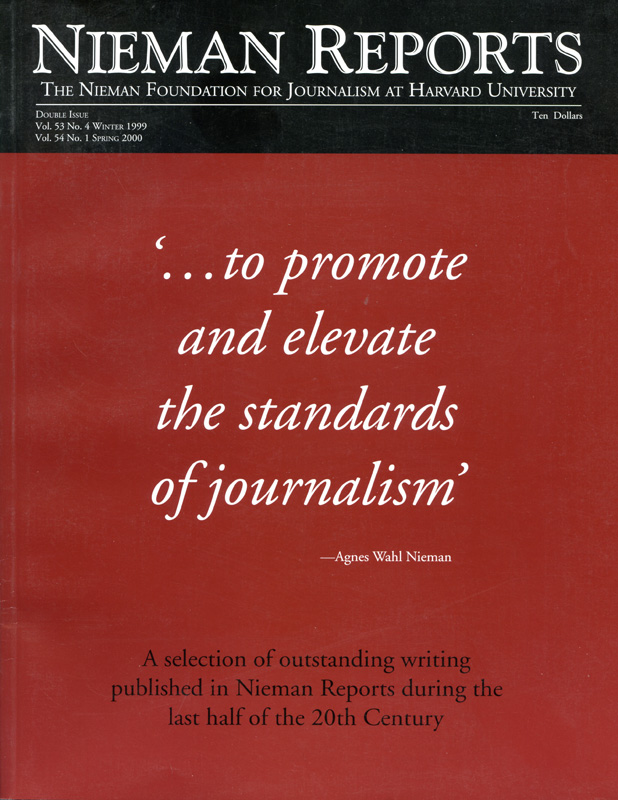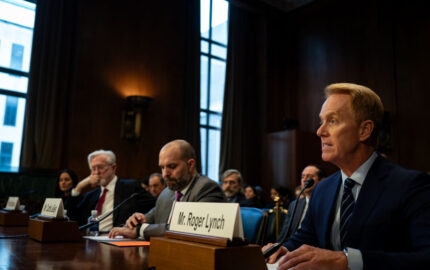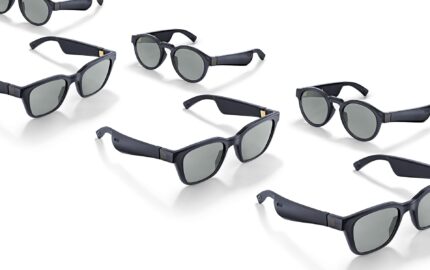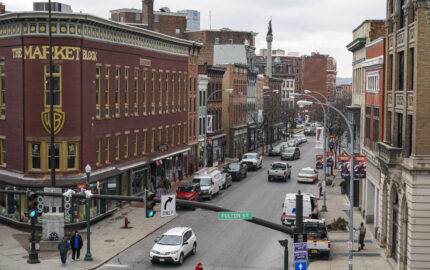[This article originally appeared in the January 1949 issue of Nieman Reports.]
“I never expected to see an old hand in the newspaper business cavorting in front of a bunch of cameras with his face covered by makeup.”
Thus Danton Walker, the Broadway columnist, paid his laughing respects to a group of veteran political reporters clustered about the WPIX news desk during the telecasting of the Republican Convention in Philadelphia. The shaft struck home because a number of us were engaged in a performance, the like of which we had never anticipated in our cub days.
It continued to fester—in my own case at least—during the ensuing months. I found myself becoming more and more deeply entangled with the problems of television as applied to the newspaper business. Since most of you are apt to become involved in the same predicament in the future, it may be that you would be interested in a recital of the problems faced and some of the tentative conclusions drawn by one of us pioneers.
I do not, however, pretend to know all the answers—or any appreciable proportion of them.
Television is a new medium and most of us seem to be feeling our way in the dark, but it definitely concerns the working newspaperman, since more and more of us are being drawn into its clutches as various newspapers invade the new field.
My own paper—the New York Daily News—established station WPIX early last summer and immediately drew upon the editorial staff for personnel. Most of the original ones came from the radio broadcasting department which had been feeding hourly news bulletins to FNEW for several years. The head of this department, the veteran Carl Warren, became Director of News and Special Events for WPIX and recruited the backbone of his staff from the News’s editorial department.
Men like Warren, who definitely transfer into the field of the new medium, are forced to learn an entirely new set of technical arrangements. They remain newspapermen but rapidly become specialists in the expanding television medium as well. They, however, have sufficient time and leisure to devote to the project to master it.
The rest of us are drawn in gradually at first, devoting only a small part of our time to the new medium—but, as time goes on, we find it occupying more and more of our attention. I presume my own case is typical.
I had never seen a television camera when I was borrowed by WPIX as a political advisor to make recommendations regarding the problems attendant upon covering the conventions. When I reported—chock full of advice—I was requested to prepare a tentative script, and the first thing I knew I was reading it under the watchful eye of a young director-engineer, who had just joined the staff from the General Electric Laboratories at Schenectady. He decided that I might be one of the performers he was seeking and, the next thing I knew, I was selected to become one of the television commentators at the convention.
The selection resulted, in my own case, in a problem with which I presume few of you would be faced. It involved my whiskers.
My Nieman classmates will perhaps recall that I sported a goatee while I was at Harvard. I had shaved it off during the war, in an effort to make myself appear younger while applying for active duty as a reserve officer. My chin had remained nude ever since.
I discovered later that I was merely one of several political writers on the News staff who had been considered for the convention assignment, and the director had sent down to the morgue for pictures of all of them. A careless librarian had submitted an old photograph of me—one which still showed me wearing the Van Dyke. When I reported the director threw up his hands in horror.
His first question explained his reaction.
“Where are the whiskers?” he asked.
“Oh, I haven’t worn a Van Dyke for seven years,” I replied.
“Hell,” declared the director. “That was one reason we picked you. We may want to put you on the air and I thought the beard might go well on television.”
“Is it essential to the job?” I asked.
“It is, if you want it,” he replied. “How long would it take you to grow it again?”
I explained that I thought I could do it in three weeks—and he insisted that I had better make the attempt if I wanted to earn the extra fee, which the station proposed to pay for the service.
I wanted the fee and so I complied. I presume that makes me one of a very few people who are paid real money for wearing whiskers—and since the goatee has become familiar to television audiences, directors of other programs insist that it be retained. It begins to look as though I am stuck with it. Especially since I became involved with additional programs soon after.
My experience at Philadelphia resulted in an offer to become the moderator of a new political forum which the station had just launched the preceding week.
I took over that weekly program and before long they asked me to participate in another one, built around the joint interview of national celebrities by Mrs. L.W. (Chip) Robert, the well-known Washington hostess and columnist for The Washington Times-Herald, and myself.
Shortly thereafter I was detailed—as a part of my regular newspaper work—to write the stories reporting the results of the Daily News’s Statewide Straw Poll and almost immediately WPIX decided that it wanted to broadcast those results. Since I was beginning to be regarded as a veteran around our young studio, I more or less naturally inherited that program as well. Thus, within the space of three months I became established in three programs a week.
There is not a great deal of money in it—at least in these early days. You get paid something for each performance (which in my case at least was a welcome addition to the family budget) and you get so interested in the work that you willingly accept more of it.
My experience so far has been limited to three kinds of programs—the forum, the interview, and the straight news commentary. Each type presents its own particular problem. But most of them are problems with which newspapermen are familiar. The solutions therefore are not too difficult.
In handling the television forum—especially if it is an audience participation show, as ours is—the moderator has to be continually on his toes, watching for libel and slander. You must follow the discussion with hawk-like accuracy because you have no chance to eliminate the libelous matter on a galley proof, if it once takes form. You cannot even replate it out and thereby hope to reduce your damages. You must be ready to gavel down the offender—and if necessary to shout him down—before he can get you into trouble.
In our political discussions we found that the charge of Communism was the most dangerous possibility to be watched. If a member of the audience attempted to brand an opponent a Red, we learned to expect immediate repercussions from the target. One such charge did get on the air, despite my pounding gavel, and the next day we had a request for a complete transcript of the show from the eminent officeholder whom a questioner had implied to be possibly a Soviet sympathizer (and who, incidentally, happened to be a Republican). Fortunately it wasn’t too specific and our explanation was acceptable. It would seem advisable, however, if the charge is once aired, to permit a defense against it to follow.
Needless to say, the moderator must be strictly impartial and avoid any appearance of favoring either side of an issue. He cannot even make a wisecrack which could be twisted into an implication that he is airing his own personal views. The temptation to make such jocular remarks simply must be resisted.
The television interview proves exceedingly difficult because the subject almost invariably refuses to go on record with anything of a controversial nature. The sight of the camera seems to slow him up exceedingly. During a radio interview he sometimes gets interested in the discussion and forgets about the microphone, but he never loses sight of the twin red eyes of the camera glowing just outside the audience’s field of vision.…
Furthermore, because of the cameras, he usually is unable to refer to notes or a prepared statement; at least he does not like to, since he prefers to seem to be speaking off the cuff, and that means that you just cannot get him to commit himself to anything that has not been rehearsed in advance. The only solution seems to be to go over the entire interview before going on the air and to permit him to answer prearranged questions in order.
It appears to work very well. One of my most successful interviews was with General Jonathan Wainwright and was conducted largely by signals. The grim old hero of Corregidor suffers from defective hearing as a result of his prison camp experience, but refuses to use a hearing aid. He could not follow the conversation in a crowded studio but he memorized in advance the order in which my questions would be asked. When I would lean forward and accidentally touch his knee, the General would begin replying to the next query. It worked out very well, too.
On the other hand, at least during these early days, most celebrities when making their first few appearances on television are much more easily handled in front of the cameras than elsewhere. They seem to be awed by the sight of the equipment and the realization that their performance is being broadcast in moving picture form.
The most dignified and eminent statesman appears to lose a considerable portion of his self-control when he enters the studio and finds himself stumbling across trailing cables and dodging between cameras and microphones. He “steps lively” when ordered to do so by the members of the sound and camera crews and ducks in pure horror if even a dead camera swings in his direction in an unguarded moment. Occasionally he freezes up with a bad case of camera fright, and then the interviewer must be prepared to wade in and keep talking until the celebrity recovers the use of his tongue.
The commentator simply finds himself talking an editorial to the camera, and his success depends upon his ability either to memorize this talk or to continue with occasional glances at fragmentary notes on the table before him. It is fatal to try to read a prepared script unless the commentary is being illustrated by a series of charts, graphs or other material—including news films. In that case it simplifies matters to pick up the script and read it, although it must be carefully marked to indicate when the live camera will return to the speaker. The trick is to drop the script and be looking at the audience as the camera comes back and you continue your conversation.
Such are a few of the problems which must be faced and solved by the newspaperman who finds himself operating with the new medium. I repeat that I do not know all the answers, and I know nobody else who does. We are experimenting every day in an effort to discover new and better ones.
But you had better begin thinking about them yourself.
You never know when they will become your problems, too.
Lowell M. Limpus, veteran correspondent and political writer of the New York Daily News, relates his initial adventures in television. He was a Nieman Fellow in 1941.
“I never expected to see an old hand in the newspaper business cavorting in front of a bunch of cameras with his face covered by makeup.”
Thus Danton Walker, the Broadway columnist, paid his laughing respects to a group of veteran political reporters clustered about the WPIX news desk during the telecasting of the Republican Convention in Philadelphia. The shaft struck home because a number of us were engaged in a performance, the like of which we had never anticipated in our cub days.
It continued to fester—in my own case at least—during the ensuing months. I found myself becoming more and more deeply entangled with the problems of television as applied to the newspaper business. Since most of you are apt to become involved in the same predicament in the future, it may be that you would be interested in a recital of the problems faced and some of the tentative conclusions drawn by one of us pioneers.
I do not, however, pretend to know all the answers—or any appreciable proportion of them.
Television is a new medium and most of us seem to be feeling our way in the dark, but it definitely concerns the working newspaperman, since more and more of us are being drawn into its clutches as various newspapers invade the new field.
My own paper—the New York Daily News—established station WPIX early last summer and immediately drew upon the editorial staff for personnel. Most of the original ones came from the radio broadcasting department which had been feeding hourly news bulletins to FNEW for several years. The head of this department, the veteran Carl Warren, became Director of News and Special Events for WPIX and recruited the backbone of his staff from the News’s editorial department.
Men like Warren, who definitely transfer into the field of the new medium, are forced to learn an entirely new set of technical arrangements. They remain newspapermen but rapidly become specialists in the expanding television medium as well. They, however, have sufficient time and leisure to devote to the project to master it.
The rest of us are drawn in gradually at first, devoting only a small part of our time to the new medium—but, as time goes on, we find it occupying more and more of our attention. I presume my own case is typical.
I had never seen a television camera when I was borrowed by WPIX as a political advisor to make recommendations regarding the problems attendant upon covering the conventions. When I reported—chock full of advice—I was requested to prepare a tentative script, and the first thing I knew I was reading it under the watchful eye of a young director-engineer, who had just joined the staff from the General Electric Laboratories at Schenectady. He decided that I might be one of the performers he was seeking and, the next thing I knew, I was selected to become one of the television commentators at the convention.
The selection resulted, in my own case, in a problem with which I presume few of you would be faced. It involved my whiskers.
My Nieman classmates will perhaps recall that I sported a goatee while I was at Harvard. I had shaved it off during the war, in an effort to make myself appear younger while applying for active duty as a reserve officer. My chin had remained nude ever since.
I discovered later that I was merely one of several political writers on the News staff who had been considered for the convention assignment, and the director had sent down to the morgue for pictures of all of them. A careless librarian had submitted an old photograph of me—one which still showed me wearing the Van Dyke. When I reported the director threw up his hands in horror.
His first question explained his reaction.
“Where are the whiskers?” he asked.
“Oh, I haven’t worn a Van Dyke for seven years,” I replied.
“Hell,” declared the director. “That was one reason we picked you. We may want to put you on the air and I thought the beard might go well on television.”
“Is it essential to the job?” I asked.
“It is, if you want it,” he replied. “How long would it take you to grow it again?”
I explained that I thought I could do it in three weeks—and he insisted that I had better make the attempt if I wanted to earn the extra fee, which the station proposed to pay for the service.
I wanted the fee and so I complied. I presume that makes me one of a very few people who are paid real money for wearing whiskers—and since the goatee has become familiar to television audiences, directors of other programs insist that it be retained. It begins to look as though I am stuck with it. Especially since I became involved with additional programs soon after.
My experience at Philadelphia resulted in an offer to become the moderator of a new political forum which the station had just launched the preceding week.
I took over that weekly program and before long they asked me to participate in another one, built around the joint interview of national celebrities by Mrs. L.W. (Chip) Robert, the well-known Washington hostess and columnist for The Washington Times-Herald, and myself.
Shortly thereafter I was detailed—as a part of my regular newspaper work—to write the stories reporting the results of the Daily News’s Statewide Straw Poll and almost immediately WPIX decided that it wanted to broadcast those results. Since I was beginning to be regarded as a veteran around our young studio, I more or less naturally inherited that program as well. Thus, within the space of three months I became established in three programs a week.
There is not a great deal of money in it—at least in these early days. You get paid something for each performance (which in my case at least was a welcome addition to the family budget) and you get so interested in the work that you willingly accept more of it.
My experience so far has been limited to three kinds of programs—the forum, the interview, and the straight news commentary. Each type presents its own particular problem. But most of them are problems with which newspapermen are familiar. The solutions therefore are not too difficult.
In handling the television forum—especially if it is an audience participation show, as ours is—the moderator has to be continually on his toes, watching for libel and slander. You must follow the discussion with hawk-like accuracy because you have no chance to eliminate the libelous matter on a galley proof, if it once takes form. You cannot even replate it out and thereby hope to reduce your damages. You must be ready to gavel down the offender—and if necessary to shout him down—before he can get you into trouble.
In our political discussions we found that the charge of Communism was the most dangerous possibility to be watched. If a member of the audience attempted to brand an opponent a Red, we learned to expect immediate repercussions from the target. One such charge did get on the air, despite my pounding gavel, and the next day we had a request for a complete transcript of the show from the eminent officeholder whom a questioner had implied to be possibly a Soviet sympathizer (and who, incidentally, happened to be a Republican). Fortunately it wasn’t too specific and our explanation was acceptable. It would seem advisable, however, if the charge is once aired, to permit a defense against it to follow.
Needless to say, the moderator must be strictly impartial and avoid any appearance of favoring either side of an issue. He cannot even make a wisecrack which could be twisted into an implication that he is airing his own personal views. The temptation to make such jocular remarks simply must be resisted.
The television interview proves exceedingly difficult because the subject almost invariably refuses to go on record with anything of a controversial nature. The sight of the camera seems to slow him up exceedingly. During a radio interview he sometimes gets interested in the discussion and forgets about the microphone, but he never loses sight of the twin red eyes of the camera glowing just outside the audience’s field of vision.…
Furthermore, because of the cameras, he usually is unable to refer to notes or a prepared statement; at least he does not like to, since he prefers to seem to be speaking off the cuff, and that means that you just cannot get him to commit himself to anything that has not been rehearsed in advance. The only solution seems to be to go over the entire interview before going on the air and to permit him to answer prearranged questions in order.
It appears to work very well. One of my most successful interviews was with General Jonathan Wainwright and was conducted largely by signals. The grim old hero of Corregidor suffers from defective hearing as a result of his prison camp experience, but refuses to use a hearing aid. He could not follow the conversation in a crowded studio but he memorized in advance the order in which my questions would be asked. When I would lean forward and accidentally touch his knee, the General would begin replying to the next query. It worked out very well, too.
On the other hand, at least during these early days, most celebrities when making their first few appearances on television are much more easily handled in front of the cameras than elsewhere. They seem to be awed by the sight of the equipment and the realization that their performance is being broadcast in moving picture form.
The most dignified and eminent statesman appears to lose a considerable portion of his self-control when he enters the studio and finds himself stumbling across trailing cables and dodging between cameras and microphones. He “steps lively” when ordered to do so by the members of the sound and camera crews and ducks in pure horror if even a dead camera swings in his direction in an unguarded moment. Occasionally he freezes up with a bad case of camera fright, and then the interviewer must be prepared to wade in and keep talking until the celebrity recovers the use of his tongue.
The commentator simply finds himself talking an editorial to the camera, and his success depends upon his ability either to memorize this talk or to continue with occasional glances at fragmentary notes on the table before him. It is fatal to try to read a prepared script unless the commentary is being illustrated by a series of charts, graphs or other material—including news films. In that case it simplifies matters to pick up the script and read it, although it must be carefully marked to indicate when the live camera will return to the speaker. The trick is to drop the script and be looking at the audience as the camera comes back and you continue your conversation.
Such are a few of the problems which must be faced and solved by the newspaperman who finds himself operating with the new medium. I repeat that I do not know all the answers, and I know nobody else who does. We are experimenting every day in an effort to discover new and better ones.
But you had better begin thinking about them yourself.
You never know when they will become your problems, too.
Lowell M. Limpus, veteran correspondent and political writer of the New York Daily News, relates his initial adventures in television. He was a Nieman Fellow in 1941.



